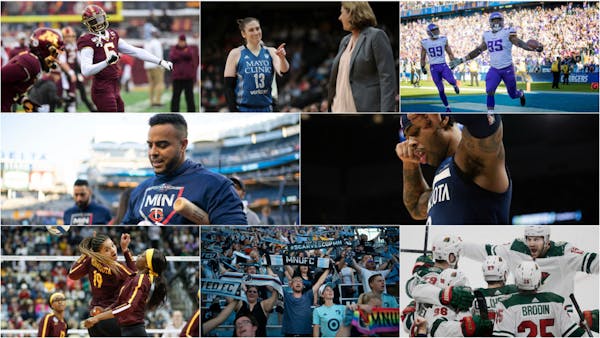That nearly annual ritual of being a Timberwolves fan — watching the lottery drawing to determine draft order — has proved to be a fruitless experience in all but one year, 2015, when the Wolves parlayed their league-worst record into the No. 1 pick and center Karl-Anthony Towns.
Like that year, the Wolves enter Thursday's edition of the lottery with the best odds of securing the top pick, although Golden State and Cleveland have the same 14% chance of being No. 1 after the NBA recently flattened the odds to discourage tanking.
This year's version of the lottery is being conducted virtually, and guard D'Angelo Russell is representing the Wolves. He has a lot of history to overcome. The Wolves have never moved up from their projected spot during a lottery drawing.
If they were to cash in and get the No. 1 pick again, this year is unlike last year when a franchise-altering prospect like Zion Williamson was available at the top.
There doesn't seem to be a consensus No. 1 pick as in some years. Some may prefer point guard LaMelo Ball, the brother of New Orleans' Lonzo Ball, who played in Australia instead of attending college.
Others might like Anthony Edwards, a guard who averaged 19 points per game at Georgia. Still others might have Memphis big man James Wiseman, but at 7-1, he may not make the most sense for the Wolves given Towns' presence in the frontcourt.
Analysts as a whole are down on the talent pool in this year's draft, which makes it seem like a bad year for the Wolves to have the most capital in it. They own their own lottery pick in addition to Brooklyn's 17th pick they acquired before the trade deadline in dealing Robert Covington as part of a four-team trade.
Give that the Wolves have a 14% chance of getting the top pick, it also means they have an 86% chance of landing somewhere else in the draft.
According to Tankathon.com, they actually have the highest chance of picking sixth. The Wolves have a 26% shot of landing there, given other teams' combined odds of jumping into the top four, which could knock the Wolves down.
The Wolves have a 13.4% chance of landing second, 12.7% of picking third and 12% for fourth. Their chance of picking fifth is 14.8% and 7% for seventh. They can pick no lower than seventh.
Of course, wherever the Wolves end up, they may not stay there permanently. In President Gersson Rosas' lone draft as Wolves boss, he moved up from No. 11 to No. 6 to take Jarrett Culver, sending Dario Saric to Phoenix in the process.
With a guaranteed top-seven pick, plus the No. 17 and No. 33 picks, the Wolves have a lot of options for Rosas to use in potential trades.
Perhaps Rosas can package both picks in a deal for some future picks (the Wolves traded a top-three protected first-rounder to Golden State in the Russell-Andrew Wiggins trade in February) or a rotational player now.
If the Wolves have a need, it's a for a defensive-minded power forward who can fit next to Towns and help compensate for some of Towns' shortcomings on that end of the court. Perhaps Rosas can use his picks as leverage in a potential deal.
If the Wolves think any draft pick is going to be a developmental project, it would probably be wisest to take this route. The clock already is ticking on Towns' and Russell's window to compete in a crowded Western Conference.
Trading a pick or picks for an already established talent would help accelerate that window. Plus, there's the added uncertainty of the coronavirus making it harder to evaluate talent by eliminating the scouting combine and restricting time teams have to interview draftees.
Wherever the pingpong balls land Thursday, this draft will be a test of Rosas' acumen in scouting and trade market evaluations.





